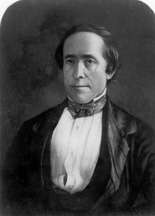Charles G. Atherton
| Charles Gordon Atherton | |
|---|---|
 | |
| United States Senator from New Hampshire | |
|
In office March 4, 1843 – March 3, 1849 March 4, 1853 – November 15, 1853 | |
| Preceded by |
Leonard Wilcox John P. Hale |
| Succeeded by |
Moses Norris, Jr. Jared W. Williams |
| Member of the U.S. House of Representatives from New Hampshire's At-large district (Seat 1) | |
|
In office March 4, 1837 – March 3, 1843 | |
| Preceded by | Benning M. Bean |
| Succeeded by | Moses Norris, Jr. |
| Member of the New Hampshire House of Representatives | |
|
In office 1830 | |
|
In office 1833–1835 | |
| Personal details | |
| Born |
July 4, 1804 Amherst, New Hampshire |
| Died |
November 15, 1853 (aged 49) Manchester, New Hampshire |
| Political party | Democratic |
| Spouse(s) | Ann Clark Atherton |
| Profession | Politician, Lawyer |
Charles Gordon Atherton (July 4, 1804 – November 15, 1853) was a Democratic Representative and Senator from New Hampshire.
Life
The son of Charles Humphrey Atherton and Mary Ann Toppan-Atherton, Charles G. Atherton was born in Amherst, New Hampshire on 4 July 1804. He was tutored in the classics by the inventor Samuel Abbot, and graduated from Harvard University in 1822 where he studied law. After graduation, Atherton was admitted to the bar in 1825 and commenced practice in Dunstable, New Hampshire (now Nashua). He married Ann Clark in 1828.
Atherton was elected as a member of the State house of representatives in 1830 and 1833–1835 and served as Speaker from 1833-1835. He was Elected as a Democrat to the Twenty-fifth United States Congress and the two succeeding Congresses (4 March 1837 – 3 March 1843) and did not seek reelection in 1842, having become a candidate for Senator.
After winning his election bid, Atherton was elected to the United States Senate as a Democrat in 1843, and served from 4 March 1843, to 3 March 1849. While in the Senate, Atherton served as Chairman of the Committee on Printing (Twenty-ninth Congress), the Committee on Roads and Canals (Twenty-ninth Congress), and the Committee on Finance (Thirtieth Congress).
After leaving the Senate, Atherton resumed the practice of law in Nashua but was again elected to the United States Senate in 1852 for the term beginning 4 March 1853. He took the oath of office on 4 March 1853, and served until he suffered a stroke while attending court and died in Manchester, New Hampshire, 15 November 1853. He is interred in Nashua Cemetery, Nashua, New Hampshire.
Atherton Gag
He was a States-rights Democrat from a northern State of New England. In his first term in Congress in 1838 he presented five resolutions which were adopted, and which created a new law that barred Congress from discussing petitions which mentioned bringing slavery to an end. He presented his five resolutions on December 11, 1838. Congress approved them on December 12, 1838. Several similar laws were approved by Congress from 1835 to 1840, but the "Atherton Gag" was the only one of them to be named after its creator.
Of the five resolutions, the last one is most indicative of his desires since it contains the vital stipulations. Mr. Atherton wrote:
5. Resolved, therefore, That all attempts, on the part of Congress, to abolish slavery in the District of Columbia or the Territories, or to prohibit the removal of slaves from State to State, or to discriminate between the institutions of one portion of the country and another, with the views aforesaid, are in violation of the constitution, destructive of the fundamental principles on which the Union of these States rests, and beyond the jurisdiction of Congress; and that every petition, memorial, resolution, proposition, or paper, touching or relating in any way or to any extent whatever to slavery, as aforesaid, or the abolition thereof, shall, on the presentation thereof, without any further action thereon, be laid on the table without being debated, printed, or referred.
References
- United States Congress. "Charles G. Atherton (id: A000323)". Biographical Directory of the United States Congress.
- Charles G. Atherton at Find A Grave
- U.S. Archives
- Keyword: "Tuesday, December 11, 1838" Search at 25th Congress, 3rd session, United States House of Representatives.
| United States House of Representatives | ||
|---|---|---|
| Preceded by Benning M. Bean Robert Burns Samuel Cushman Franklin Pierce Joseph Weeks |
Member of the U.S. House of Representatives from New Hampshire's at-large congressional district March 4, 1837 – March 3, 1843 Served alongside: Samuel Cushman, James Farrington, Joseph Weeks, Jared W. Williams, Edmund Burke, Ira A. Eastman, Tristram Shaw and John R. Reding |
Succeeded by Edmund Burke John P. Hale Moses Norris, Jr. John R. Reding |
| United States Senate | ||
| Preceded by Leonard Wilcox |
U.S. Senator (Class 3) from New Hampshire March 4, 1843 – March 3, 1849 Served alongside: Levi Woodbury, Benning W. Jenness, Joseph Cilley and John P. Hale |
Succeeded by Moses Norris, Jr. |
| Preceded by John P. Hale |
U.S. Senator (Class 2) from New Hampshire March 4, 1853 – November 15, 1853 Served alongside: Moses Norris, Jr. |
Succeeded by Jared W. Williams |
| Political offices | ||
| Preceded by Dixon Lewis Alabama |
Chairman of the U.S. Senate Committee on Finance 1847–1849 |
Succeeded by Daniel Dickinson New York |
